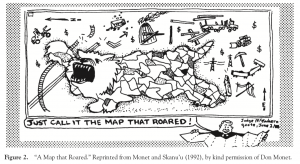Blog #7: The Map That Roared
In order to address this question you will need to refer to Sparke’s article, “A Map that Roared and an Original Atlas: Canada, Cartography, and the Narration of Nation.” You can easily find this article online. Read the section titled: “Contrapuntal Cartographies” (468 – 470). Write a blog that explains Sparke’s analysis of what Judge McEachern might have meant by this statement: “We’ll call this the map that roared.”
“We’ll call this the map that roared.”
Judge McEachern’s words have sparked an interest around their ambiguity, especially from Matthew Sparke himself.
Sparke begins his discussion by mentioning two possible interpretations:
“The map that roared” could refer to a “paper tiger,” thereby denouncing the map by classifying it as a tool that is perceived to be powerful but in reality, is ineffectual (Sparke 468).
Another quick interpretation finds that perhaps McEachern was referencing “The Mouse that Roared,” the “1959 Peter Sellers movie satirizing Cold War geopolitics” (Sparke 468).
However, in addition to these outwardly interpretations, Sparke notes the deeper analysis surrounding McEachern’s ambiguous phrase, inspired by Don Monet’s following figure:

Figure from Sparke’s Article
In Sparke’s eyes, McEachern’s reference to a roaring map “evoked the resistance in the First Nations’ remapping of the land: the cartography’s roaring refusal of the orientation systems, the trap lines, the property lines, the electricity lines, the pipelines, the logging roads, the clear-cuts, and all the other accoutrements of Canadian colonialism on native land” (468).
In other words, simply upon unfolding the map and not noting any reference or acknowledgement to Canadian institutions, made “We’ll call this the map that roared” the first words that came out of Judge McEachern’s mouth.
If indeed, this is what Judge McEachern meant, then this is yet another example of the dominance of colonial voices and knowledge over Indigenous voices and knowledge. McEachern was not able to give credibility to the map and did not regard it as evidence, as he himself did not see it as such. He disowned it as he could not recognize the Canadian nation on the map as he was accustomed to, and used such a lens to disregard the map. That is perhaps why he called it “the map that roared,” as it attempted to “roar” and resist against so-called Canadian embellishments.
If anything, such an admission by Judge McEachern points to his antagonism and his own refusal in understanding the cartography. If anything, McEachern can be labelled as “the judge that roared,” as he actively resisted Gitxsan and Wet’suwet’en claims to their land via their map. As Professor Paterson discusses, there is literacy involved in reading maps. If the judge could not read this map, he can be perceived as illiterate.
The Delgamuukw court case, unsurprisingly, also featured even more of Judge McEachern’s illiteracy and “roaring,” as he regarded the Gitxsan as “nasty, brutish, and short” because they had “no written language, no horses or wheeled vehicles” (“The Delgamuukw Court Action.”). As Sparke notes, the judge even made a trip to their territory through a “three-day helicopter and highway ‘view’ in June, 1988,” where McEachern familiarized himself with “this beautiful, vast, and almost empty part of the province” (477). Through his ethnocentric and ignorant characterization of the territory as “almost empty,” the judge, out of his own submission, keeps contributing to his illiteracy (Sparke 477).
The eurocentric lens through which Judge McEachern dismisses the map reminds me of a quote by J.M. Blaut: “Eurocentrism is quite simply the colonizer’s model of the world.”
When I read this quote, it seems to remove blame from the individual colonizer or colonizing perspective, as it theorizes eurocentrism. Simultaneously however, I think it speaks to how those viewing the world with a eurocentric lens are only accustomed to and willing to accept the colonizer’s model of the world. Anything that “roars” against it, will inevitably be condemned.
What do you all think about the aforementioned quote – does it seem to favour eurocentrism or place responsibility on it? Do you think it serves as an explanation to Judge McEachern’s “We’ll call this the map that roared”?
Works Cited
“J.M. Blaut.” Guildford Press, https://www.guilford.com/author/J-M-Blaut. Accessed 18 February 2019.
Sparke, Matthew. “A Map that Roared and an Original Atlas: Canada, Cartography, and the Narration of Nation.” Annals of the Association of American Geographers, vol. 88, no. 3, 1998, pp. 463-495.
“The Delgamuukw Court Action.” Gitxsan Community News, http://www.gitxsan.com/community/news/the-delgamuukw-court-action. Accessed 18 February 2019.
Hi Simran,
Thanks for your insights on Sparke’s article! I answered the same question for my 2.6 assignment, so it was interesting to read your perspective on the judge’s statement. You didn’t dive to deep into Sparke’s suggestion of a connection to the “paper tiger” concept, so I was curious how you thought the concept of the “paper tiger” related not only to the judge’s statement, but also to how we view Indigenous knowledge in general.
Hi Cassie,
Thank you for your comment! In regards to the paper tiger idea, it seems as if the judge was attempting to discredit their map, by associating it with connotations of being outwardly powerful yet inwardly weak. In other words, the judge was condemning Indigenous voices.
I believe many people view Indigenous knowledge similarly. At first glance, they may see it as a powerful social reality but this view is quickly overcome by dominant stereotypes in our world today that all point to Indigenous peoples and their stories as inferior and weak. Many may feel threatened by Indigenous voices, which is why these stereotypes have come into existence in the first place. Such negative views persist because of larger views noting Indigenous populations and their efforts as ineffectual.
I hope that people, both on an individual level and as a collective, soon learn to acknowledge and appreciate Indigenous knowledge, stories, and people, rather than characterizing them through an Us vs Them framework.